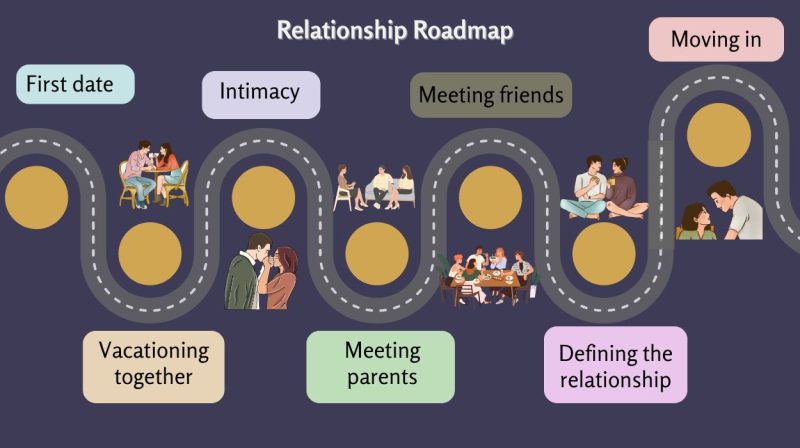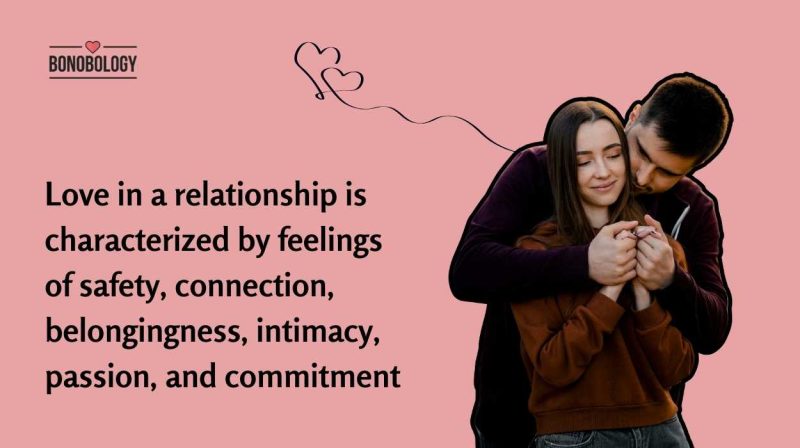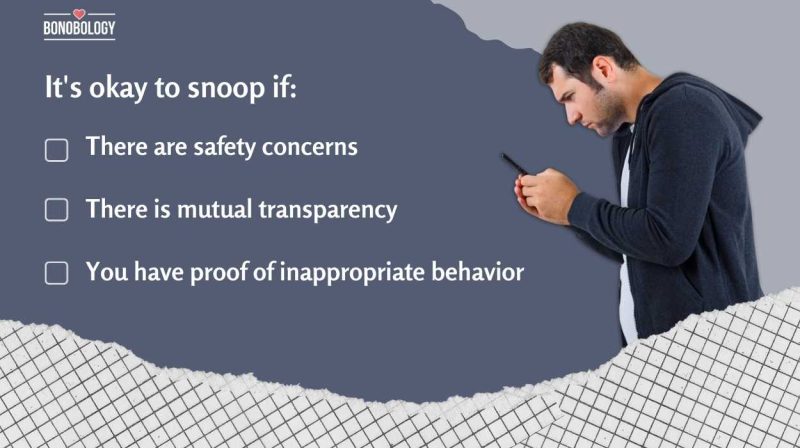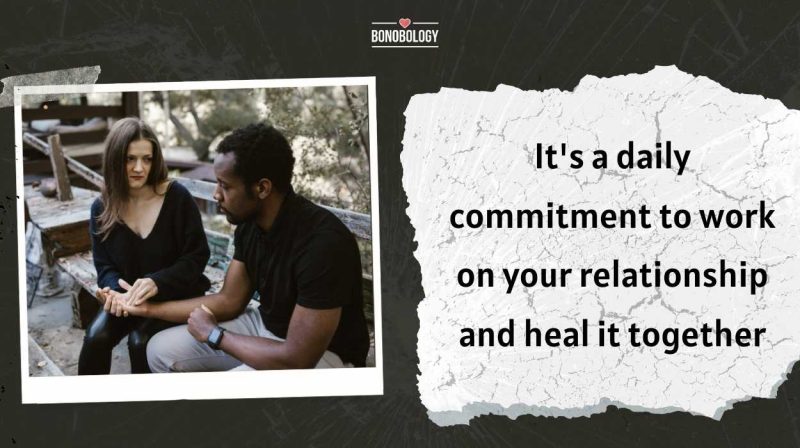Infidelity is one of the toughest challenges a relationship can go through. Even though it’s a relationship deal-breaker for many, it doesn’t necessarily have to be the end of the road for a couple. There are infidelity recovery stages to heal from an affair that can help you heal and reconnect afresh with one another or find a way to move on in peace.
Yes, recovering from infidelity may not always mean you stay together. But no matter what you decide – whether to stay together and give your relationship another chance or move on and turn over a new leaf – it’s important to go through the stages of healing after infidelity. To get a little more insight into the process, we spoke to clinical psychologist Devaleena Ghosh (M.Res, Manchester University), founder of Kornash: The Lifestyle Management School, who specializes in couples counseling and family therapy.
7 Stages To Heal From Infidelity – Explained By An Expert
Table of Contents
“The process of healing from infidelity is extremely challenging, but it is possible to recover a relationship if both parties want it badly enough and work through their deeper issues to repair the broken trust. A majority of couples don’t reach that stage of healing from infidelity, but those who undergo therapy often emerge stronger as individual personalities as they have gone through the process of recovery,” Devaleena says.
Healing after an affair takes rebuilding trust, vulnerability, and a willingness to feel all your feelings, no matter how negative or overwhelming. A little structure is always useful during confusing times, so with Devaleena’s guidance, we’ve rounded up some key infidelity recovery stages to help you on your journey.
Stage 1: When you discover the affair
“This is the day you find out that your partner has been cheating on you. This is the toughest part of the process and yet, this can be the moment you decide to heal. This is also a phase of shock and your physical and emotional self will be reeling. You’ll experience bodily discomfort, almost as if you can foresee danger ahead. Millions of questions will loom in your head, followed by intense anger, self-doubt, remorse, a sudden drop in self-worth and confidence,” says Devaleena.
The discovery stage is especially tough because in a moment, your entire relationship seems like a lie and you’re thrown into a void of doubt and betrayal. This will be a stage of denial, disbelief and maybe even sheer numbness. You may find yourself consumed by obsessive thoughts after infidelity to an extent that processing your own feelings seems like an impossibility.
While it’s never too early to choose to start healing, it’s also important to let these feelings flow through you without judgment or rush. Whenever you are hit by a wave of uncomfortable emotions, don’t try to run away from them. Instead, slow down and feel their full extent. Healing will come; in fact, all of this is a part of recovering from infidelity.
Related Reading: The 3 Types Of Men Who Have Affairs, And How To Recognize Them
Stage 2: Taking time to grieve
“When I found out my partner was cheating on me, it was as though a dam burst inside me,” says Katrina. “I’m not usually very expressive with my emotions and prefer to work through things quietly. But I couldn’t hold back in this case. There were days and weeks where I’d just be crying for hours.”
“The grieving stage lasts longer and is usually entwined with lots of other emotions,” Devaleena says. “At this stage, one often starts rethinking the beginning of the relationship and how it all changed. Grief is essential to healing after an affair as there’s no getting better without allowing yourself to mourn over the loss.
“It feels like your whole world has collapsed. Your faith, your past, and also your future are now on shaky ground. Cry, shout, scream it out if you must, you need to experience this intense pain. Vent, and don’t hold yourself back,” she adds. Stages of infidelity recovery can be hard and emotionally draining but it’s a rite of passage without which there can be no healing.
Finding out about your partner cheating on you comes with a feeling of tremendous loss. You are mourning the death of your relationship as you thought it was, you are grieving over the loss of trust and faith and love. You’re battling dealing with heartbreak, so treat it as a period of mourning, and nothing less.
Stage 3: Finding the path to acceptance
We’d love to tell you that once the tears have dried and the anger has calmed itself, you’re well on the road to acceptance and healing from infidelity. Unfortunately, says Devaleena, this could take years and will require you to work on yourself every single day.
“I kept asking myself, what am I accepting exactly,” says Charlie, whose partner of 7 years cheated on him. “It took a while to realize that I wasn’t condoning what my partner had done, I was accepting that it happened, that it was a reality, and that I needed to get on with my life in a positive, healing manner.”

It may seem unfair that you have to put in the work in a situation where you’re already hurt and vulnerable. But, working on yourself doesn’t make any of this your fault. You are not taking accountability or responsibility for your partner’s actions. You are simply taking a step forward in the infidelity recovery stages, and alleviating your own pain so that you can move on.
“To reach this stage will take time. But, having faith and working on yourself every single day does bring about healing and acceptance. You just come to a point where you can’t stand the hurt anymore and you decide to do something about it. It doesn’t always mean that you have forgiven your partner or you start believing that it wasn’t a big deal. It just means that you have decided to give yourself a fresh start, come to peace with your past and make a new life for yourself,” Devaleena says.
Related Reading: 6 Signs That He’s Not Really Trustworthy
Stage 4: Deciding your next steps
Now that you’ve reached a level of acceptance, what’s next? Well, now you’re at that stage of the infidelity recovery timeline where you need to make concrete decisions. Do you plan to continue with your relationship, or is infidelity a dealbreaker for you? If you do plan to stay together, what new relationship boundaries and rules do you plan to set? And what do you intend to do together that will actively rebuild the broken trust and connection between you?
If you’re planning on separating, there are questions to be pondered here, too. Who’s moving out and where will they go? Is this a trial separation where you both just need some time to figure things out, or are you convinced you’re never getting back together? Then of course, if you’re married and/or have kids, the inevitable questions of custody and financial settlements will arise.
If you’re the one who’s been cheated on, chances are you’re still a little shaky and vulnerable. Taking decisions alone might seem daunting at the moment. Talk to people you trust – friends, family etc. Seek professional help if needed. But also, trust your gut. This isn’t just about whether you want to remain in your relationship or end a toxic relationship, but also about what sort of life you want to build for yourself. This is one of the most important stages of healing after infidelity.
Stage 5: Looking at deeper issues
If you have decided to remain together in your relationship, it’s time to ask some uncomfortable questions and dig deeper into what led to the infidelity. Mind you, we’re not talking about sordid details, but rather, a holistic and detached view of your relationship. And this can prove to be the hardest of the stages of infidelity trauma to navigate.
Infidelity usually occurs when one or both partners feel that something is missing or lacking in their current relationship. It isn’t always the lack of physical intimacy, although that’s definitely a common way for infidelity to begin. But there’s also a chance that a partner was looking for a greater emotional connect or someone with whom they have more in common.
Maybe you’ve both been so busy at work that your relationship fell by the wayside. Maybe you have kids and now your primary roles are parents rather than partners and lovers. What do you need to rekindle and resurrect, and what do you need to build from scratch – these are important questions to ask.
There are, of course, those who simply wanted ‘something different.’ In which case, it would be a good idea to sit down and air out just what is missing in the relationship. Remember, none of this points to something lacking in you as a person. These aren’t deficiencies in your physical or emotional makeup, and if your partner makes you feel that they are, you need to dump them, and fast!
Stage 6: Creating a timeline of healing
As we said, giving a structure to the healing process helps you break it down into things you can handle in the infidelity recovery stages. Recovering from infidelity is never a picnic, so having a timeline and structure makes it a little easier.
Now, grief and acceptance cannot be rigidly timed and we know this. But, pay attention to what sort of action you’re taking at every stage so you don’t get stuck in any of the stages of healing after infidelity. Taking your time to heal is vital, but remaining in a stage of denial or grief for too long will erode your self-confidence and any zest for life and moving on.
An infidelity recovery timeline is a good way to keep yourself from getting lost in the infidelity recovery stages, Since all of this involves strong emotion, it’s easy to get sucked into it, and be far too exhausted to do anything that heals you.
Make a note of things you’re doing for yourself every day. See how long it’s been since you went out with a friend and talked about something other than your relationship. Or at least talked about your relationship without issuing death threats and dissolving into tears. Practice a little self-love. Structure and a timeline lend a little certainty to this whole overwhelming process of recovering from infidelity. And sometimes, that’s just what you need.
Related Reading: 11 Feelings One Goes Through After Being Cheated On
Stage 7: Actively working on your relationship
Assuming you have decided to stay together, a key and perhaps final stage of these infidelity recovery stages is to actively work on your relationship. Now, ‘final’ doesn’t really mean it’s all done with – working on a relationship is technically a lifelong process after all.
“There are couples who decide to work on their relationship after the whole turbulent phase that they’ve been through. Both mutually decide to give things another try. This is the time when therapeutic assistance is of utmost importance. In therapy or couple’s counseling they are guided to connect as two new people, keeping in mind not to have any major secrets from each other,” says Devaleena.
“Then, couples are also taught how to effectively disclose uncomfortable issues and communicate with patience rather than pettiness. They are taught to reconnect with themselves first, know themselves better and then reconnect with the other,” she adds.
Active work on your relationship will take tremendous energy and vulnerability, so be prepared. It’s not much help at this point to be defensive or deliberately say hurtful things in the relationship. Voicing your anger and hurt and grief is absolutely your right, hurling insults and being petty will only prolong your own pain and make repairing your relationship that much harder.
Infidelity recovery stages are neither simple nor easy. But breaking them down and articulating the actions you need to take makes it a little more coherent in the middle of the emotional whirlpool you find yourself in.
“I don’t know where my partner and I stand yet,” says Jo, who is attempting to recover from her husband’s infidelity after 13 years of marriage. “But it is a little easier knowing that there’s some sort of symmetry to what I, and we, need to do. I didn’t even know where to start when I first found out about the affair. Then, after going to see a counselor, I had a little more clarity. I still don’t know where we’ll end up, or even if we’ll end up there together. But, I have a little more confidence that either way, I will heal from this.”
For more expert videos please subscribe to our Youtube Channel. Click here.
How To Recover From An Affair And Move Forward – Expert Tips
These infidelity recovery stages may seem pretty straightforward on the surface of it, however, there is nothing straightforward or linear about healing from a setback as devastating as the betrayal of trust by the one person who meant the world to you. Recovery from affairs can be a tall order for even couples who have had robust and wholesome relationships before the blow of infidelity tore them apart.
You need the right support and help to be able to go through the different stages of infidelity trauma and emerge on the other side as a healed individual who is capable of rebuilding the relationship. Even if while recovering from infidelity you realize that you do not want to give the relationship or your cheating partner another chance, healing and coming to terms with the betrayal is essential to be able to forge healthy relationships in the future.
So, what is the right approach to healing from the setback of infidelity? We’re here to offer you the aforementioned “right support and help” to find the answer to this and many other similar questions that may be weighing on your mind with these expert-backed tips on how to recover from an affair and move forward:
Related Reading: How To Heal After Being Cheated On And Stay Together
1. Share your pain for recovering from infidelity
When we speak about the stages of infidelity and the process of healing from it, the focus is always on the emotional state of the partner who has been cheated on. However, the cheater too has their share of emotional turmoil and trauma to work through during this time. This is why one of the best ways of recovering from infidelity is to share your pain with each other.
Devaleena says, “Remorse is not only inevitable but also healthy when a relationship has suffered a setback on account of a partner’s infidelity. However, being stuck in the stages of guilt after cheating isn’t going to serve any purpose. Instead of bottling up your feelings, which will only cause you to push your partner further away, reach out, open up and talk.”
While the partner who has been cheated on can share the pain, hurt, and humiliation they experienced when the affair came to light, the cheating partner can open up about their guilt and shame. This can work wonders in reinstating intimacy in the relationship and bridging the chasm between the two partners.
2. Prioritize honesty in your relationship
Infidelity and dishonesty in a relationship go hand in hand. The cheating partner is bound to have spun a web of lies to get away with their transgressions and cover their tracks. When an affair comes to light, these lies also get their moment in the sun. As a consequence, the partner who has been cheated on may begin to feel as if the entire relationship has been a lie.
To undo this damage and avoid obsessive thoughts after infidelity taking a toll on the relationship, both partners must prioritize honesty. “Partners need to practice honesty and transparency to be able to heal the cracks that have emerged in their bond after the revelation of cheating. At the same time, it is extremely vital to be honest with yourself about how you feel,” says Devaleena.
Staying in denial about the impact of infidelity will do more harm than good. The longer you keep these feelings bottled up, the more resentment and contempt they’ll trigger. Over time, these pent-up feelings can overwhelm you, making it impossible for you to reconnect with your partner

3. Go through the stages of infidelity before you forgive
Forgiving too quickly or brushing aside something as monumental as infidelity as if you’re brushing off a scraped knee can have far-reaching consequences for the future of your relationship in the long haul. Devaleena says, “The biggest problem with hurried forgiveness is that it emboldens the cheating partner. They begin to feel that they’ve gained an upper hand in the situation and do not hesitate in falling back to their old patterns.
“As a result, you may find yourself in the thick of a new cycle of stages of infidelity trauma even before the old scars have healed. While forgiveness in a relationship is a quality to aspire to, it should not be premature and must come organically after the cheated partner has processed and come to terms with all the emotional upheaval and trauma they’ve been through.”
4. Redefine your relationship rules and boundaries
An important aspect of healing from infidelity is remembering that your relationship has changed forever. Things will never go back to the way they were in the pre-infidelity phase of your relationship. A lot of couples are intimidated by this thought and cling to the idea of resurrecting that old connection at all costs.
However, reinventing your relationship dynamics isn’t necessarily a bad thing. It gives you an opportunity to discard old, unhealthy relationship patterns and replace them with new ones. If you follow the right path, you have an opportunity to build a relationship that’s more wholesome and holistic than the one you shared in the past.
“Conversations about rebuilding a relationship after infidelity must focus on redefining your equation and setting boundaries. When you communicate, make sure that the essence is not lost in the noise of all the emotions and feelings. You can even consider putting your thoughts in writing so that you can clearly communicate the terms and expectations from your relationship 2.0,” says Devaleena.
Related Reading: The 7 Types Of Boundaries You Need To Make Your Relationship Stronger
5. Prioritize quality time with each other
There is an undeniable awkwardness in rebuilding a relationship after cheating. From saying “I love you” to your partner for the first time after recovering from infidelity to getting sexually intimate with them again, there will a lot of moments of hesitation and unsurety. If not dealt with correctly, obsessive thoughts after infidelity can consume you in moments like these.
You can navigate this tricky aspect by prioritizing your relationship and one another above all else. “Making a conscious effort to spend more quality time with one another is crucial to undoing the degeneration that has already taken place.
“In therapy, we often encourage couples to partake in bonding activities such as going on walks together or scheduling date nights, creating light-hearted and fun moments, and even working on reviving physical intimacy. Both partners need to get comfortable with the idea of being close to one another. That’s why acts of affection such as hugging, touching, holding hands are helpful,” says Devaleena.
Key Pointers
- A relationship typically goes through 7 infidelity recovery stages –discovery to grief, acceptance, introspection, healing, decision-making, and finally, moving forward
- None of these steps are easy to navigate for either the cheating partner or the one who has been cheated on
- Progress is neither linear nor straightforward; you may remain stuck in one stage for too long or relapse just when you seem to be making progress
- Honest, transparency, boundary setting, timely forgiveness, and quality time together can help in recovery from affairs
Reaching out for help, giving voice to your hurt, and knowing you have the right to grieve are all important parts of the infidelity recovery timeline. Remember, the timeline could look different for everyone, so don’t beat yourself up if you need to take a little extra time. Ultimately, you need to look out for your own health, and that of your relationship. And that takes courage, kindness, and a strong sense of self. It’s not going to be easy, but you’ll get there. Just take it step by step, stage by stage.
FAQs
While it’s a good idea to have an infidelity recovery timeline, there’s no fixed time by which you’ll heal from infidelity. There’s rarely one ‘aha’ moment where you’re all healed and ready to move on. There are stages to healing from infidelity and there’s no guarantee that the scars will go away completely. So, give your healing a timeline by all means, but don’t beat yourself up if you can’t stick to it completely.
Don’t assume it was your fault, and don’t rush out to get revenge or fling yourself into a rebound relationship. Take time to process and mourn. Remember, your relationship as you knew it has ended forever, even if you decide to stay together and work through it. You need to take time to let things sink in and let your feelings flow.
A study found that only 16% of relationships in the USA work out after infidelity is discovered. That’s a low figure, but it doesn’t mean yours won’t work out if you’re both willing to put in the work. On the other hand, it’s not the end of the world if the relationship doesn’t work out. If infidelity is a dealbreaker for you, stick to your convictions. There’s no point in remaining in a relationship if you’re miserable, after all.
10 Common Marriage Reconciliation Mistakes To Avoid After Infidelity
15 Signs A Breakup Is Near And Your Partner Wants To Move On
Your contribution does not constitute a charitable donation. It will allow Bonobology to continue bringing you new and up-to-date information in our pursuit of helping anyone in the world to learn how to do anything.





















